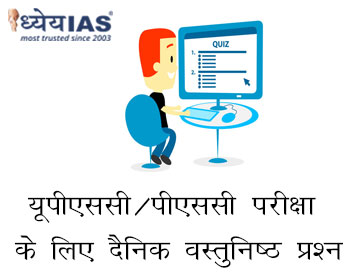Current Affairs MCQs Quiz for UPSC, IAS, UPPSC/UPPCS, MPPSC. BPSC, RPSC & All State PSC Exams
Date: 19 March 2022
Q1. Consider the following statements about Credit Guarantee Schemes:
1. Under the scheme, only new enterprises are eligible to take loan from
banks.
2. The corpus of Credit Guarantee Schemes is being contributed by the Government
and SIDBI in the equal basis.
Which of the statement/s given above is/are correct?
a) 1 and 2only
b) 2 and 3only
c) 1 and 3 only
d) 1only
Answer: (D)
Explanation:
- Both the existing and the new enterprises are eligible to be covered under the scheme.
- The corpus of CGTMSE is being contributed by the Government and SIDBI in the ratio of 4:1 respectively.
Q2. Consider the following statements:
1. An interim trade agreement is a precursor to an FTA/CECA/CEPA between two
trading partners.
2. Free Trade Agreements are more comprehensive than a Comprehensive Economic
Partnership Agreements.
Which of the statement/s given above is/are correct?
a) 1 only
b) 2 only
c) Both 1 and 2
d) None of these
Answer: (A)
Explanation:
- An interim trade agreement is a precursor to an FTA/CECA/CEPA between two trading partners.
- Partnership agreement or cooperation agreement are more comprehensive than an FTA.
Q3. ‘Force majeure’ is term most appropriately used in?
a) Legislative Procedure
b) Contract among parties
c) Internet of Things
d) Cryptocurrency
Answer: (B)
Explanation: Force majeure is a common clause in contracts which essentially frees both parties from liability or obligation when an extraordinary event or circumstance beyond the control of the parties.
Q4. Consider the following statements regarding 'Deep Ocean Mission' :
1. The cost of the Mission has been estimated at Rs. 14,000 crore over a
five-year period.
2. The Ministry of Science and Technology will be the nodal ministry
implementing this multi-institutional ambitious mission.
3. Mission has mainly six components and is key to supporting the Blue Economy
Initiatives of the Government of India.
Select the correct answer using the code given below.
a. 1 and 2 only
b. 3 only
c. 2 only
d. 2 and 3 only
Answer: (B)
Explanation:
- The cost of the Mission has been estimated around Rs. 4,000 crore over a five-year period and will be implemented in phases.
- MoES will be the nodal ministry implementing this multi-institutional ambitious mission.
- It has mainly six components and is a mission mode project to support the Blue Economy Initiatives of the Government of India.
Q5. Biorock technology is related to
A) Technology to create rocks for helping BRO to create roads at fast pace
B) Technology to aid corals to build reefs at faster pace
C) Technology to aid biologists to study various rocks
D) Technology to create rocks which can be used to protect sea shores from
coastal erosion
Answer: (B)
Explanation: Biorock is the name given to the substance formed by electro accumulation of minerals dissolved in seawater on steel structures that are lowered onto the sea bed and are connected to a power source - this would aid in corals to develop at faster pace
Q6. Consider the following the questions.
1. Nitrogen, phosphorus and Potassium are the “Big 3” primary nutrients in
commercial fertilizers.
2. The appropriate NPK ratio under Indian soil conditions is stated to be 4:2:1.
Which of the above statements is/are Not correct?
a) 1 only
b) 2 only
c) Both 1 and 2
d) Neither 1 nor 2
Answer: (D)
Explanation:
- Nitrogen, phosphorus and potassium, or NPK, are the “Big 3” primary nutrients in commercial fertilizers. Each of these fundamental nutrients plays a key role in plant nutrition.
- The appropriate NPK ratio under Indian soil conditions is stated to be 4:2:1. Gujrat is the largest producer of fertilizer in India. More than 14% of the total fertilizer factories are located here.
Q7. Consider the following statements:
1. India possesses only four per cent of the world’s freshwater resources.
2. Steps for augmentation, conservation and efficient management of water
resources are primarily undertaken by the Union Government.
Which of the statement/s given above is/are correct?
a) 1 only
b) 2 only
c) Both 1 and 2
d) None of these
Answer: (C)
Explanation:
- Although India has 16 per cent of the world’s population, the country possesses only four per cent of the world’s freshwater resources.
- Water being a State subject, steps for augmentation, conservation and efficient management of water resources are primarily undertaken by the respective State Governments.








